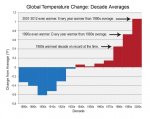- Joined
- Jan 28, 2013
- Messages
- 94,823
- Reaction score
- 28,342
- Location
- Williamsburg, Virginia
- Gender
- Male
- Political Leaning
- Independent
I was just in Glacier Bay. The answer to this question is an emphatic NO. People who have studied the glaciers, and long-time residents all agree that the glaciers are receding substantially. More GARBAGE from the high-schooler, Watts.
Glacier Bay is in Alaska. Glacier National Park is in Montana. I guess Watts took geography in high school. Did you sleep through that class?:lol:

